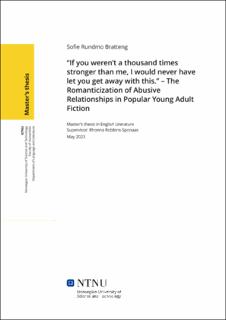“If you weren’t a thousand times stronger than me, I would never have let you get away with this.” – The Romanticization of Abusive Relationships in Popular Young Adult Fiction
Master thesis
Permanent lenke
https://hdl.handle.net/11250/3078706Utgivelsesdato
2023Metadata
Vis full innførselSamlinger
Sammendrag
Denne oppgaven undersøker påvirkningen av skildringer av voldelige forhold i young adult-romantikklitteratur. Young adult-sjangeren har blitt et sosiologisk fenomen og har store lesertall jorden rundt. Målgruppen, ungdommer og unge voksne, er lettpåvirkelige og emosjonelle. Ved å se på forholdsdynamikkene i Twilight, After og It Ends with Us samtidig som man retter fokuset mot leserempati og identitetsutvikling, vil denne oppgaven diskutere hva romanene kommuniserer til unge lesere angående usunne forhold og ubalanserte maktdynamikker i young adult-romantikklitteratur, enten ved uhell eller med vilje. Denne oppgaven argumenterer for at indre motivasjoner som følelsestrigging og den påfølgende leserempatien sammen med eksterne motivasjoner som sosiale medier og filmatisering jobber sammen med andre innflytelser som målrettet markedsføring jobber sammen for å akseptere og normalisere disse skildringene. Dette fører til en skadelig innvirkning på den unge leseren, for eksempel å ikke kunne gjenkjenne skadelig forholdsdynamikk. This thesis examines the impact of portrayals of abusive relationships in young adult romance literature on adolescent readers. The genre of young adult literature has become of sociological phenomenon and is consumed in large scale across the globe. The adolescent reader target group is easily influenced and emotional. Looking at the romantic relationship dynamics in Twilight, After and It Ends With Us while also focusing on the young adult reader’s empathy and identity formation, this thesis will seek to unpack what the novels convey to young readers, either deliberately or coincidentally, concerning unhealthy relationships and unbalanced power dynamics in young adult romance fiction, in addition to looking at reader response and the role of the young adult novel in society.The thesis argues that intrinsic motivations such as emotion evocation and the following narrative empathy, along with extrinsic motivations such as social media and film adaptations work together with other influences such as targeted marketing work together to accept and romanticize the portrayals. This leads to detrimental impact on the adolescent reader, such as not being able to recognize harmful relationship dynamics.
